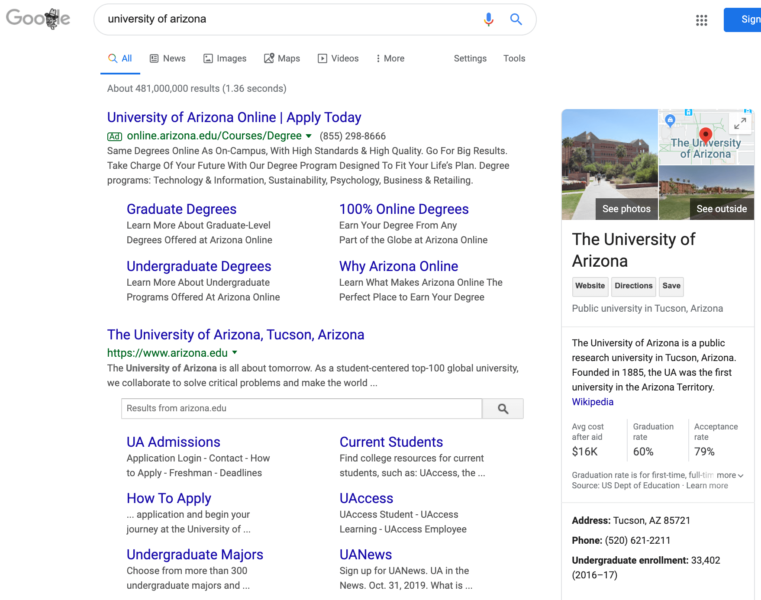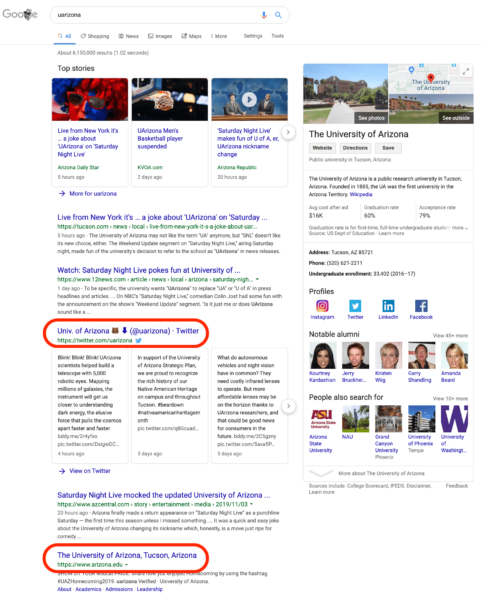Why the University of Arizona changed its abbreviation for SEO
Will “UArizona” distinguish it from competitors and other well-known brands in search results if people still search “UA”?
To bolster its SEO, the University of Arizona has changed its abbreviation from “UA” to “UArizona,” AP News reported last week. The southern Arizona university appears below Under Armour, United Airlines as well as another educational institution, the University of Alabama, for the query “UA.”
The case for “UArizona.” Ranking first for your business’ name is quintessential for most brands and, as shown below, the University of Arizona does just that.

However, the university is also commonly referred to as “UA,” as seen in the knowledge panel above. The acronym’s simplicity is also what makes it more ambiguous, leading to more competition for that term on the search results.

“If people were trying to find them in search and typing ‘UA,’ they’d have to wade through quite a few irrelevant results and perhaps get distracted in the process. This isn’t exactly an ideal search experience,” said Amanda Milligan, marketing director for organic search agency Fractl.
Ranking fourth organically for a term that your audience commonly uses to refer to your business is not ideal, but it may not have been so impactful if the results above the University of Arizona were for brands in unrelated industries.
“It seems that the problem was people were searching ‘UA’ and not finding them ranking first, and even worse, a competing school was ranking higher than them,” said Eric Enge, general manager at Perficient Digital.
An SEO tweak. “When these things are approached the right way from an SEO perspective, they can be relatively painless,” said Enge. “What typically makes it harder is when changes result to the domain or the URL structure of the site.”
Since the keyword that the university wanted to rank higher on was actually an acronym and not its official name, it was able to implement a strategy that wouldn’t require rebuilding its SEO from the ground up. Although Search Engine Land has reached out to the University of Arizona for comment, we did not receive a response.
“It wasn’t a complete rebrand; it was really a tweak that has large SEO ramifications but is still true to the original name,” said Milligan. The institution has updated its Twitter handle to @uarizona, but still uses “The University of Arizona” for its site title and logo.

Aside from news coverage resulting from the University of Arizona’s shift to “UArizona,” the institution ranks first for the query.
As seen in the screenshot above, the University of Arizona’s knowledge panel appears for the query “uarizona,” and the institution is the top non-news-related organic result, which is a win if one of the main goals was distinguishing itself from competing universities.
Why we should care. “The issue here relates to what they hope to accomplish,” Enge said. “There is a general public audience that is used to referring to the school as ‘UA.’ What they’re really trying to do, I believe, is change how users search for them, and that’s inherently more complex.”
Ranking first for a query will not drive the desired result if nobody is searching for your brand by that term. However, if you can find ways to influence how your target audience seeks you out — by nudging them away from “UA” and towards “UArizona,” in this particular case — the increased visibility on search results and distraction-free search experience for your users is likely to be worth the investment.
Opinions expressed in this article are those of the guest author and not necessarily Search Engine Land. Staff authors are listed here.
Related stories
New on Search Engine Land